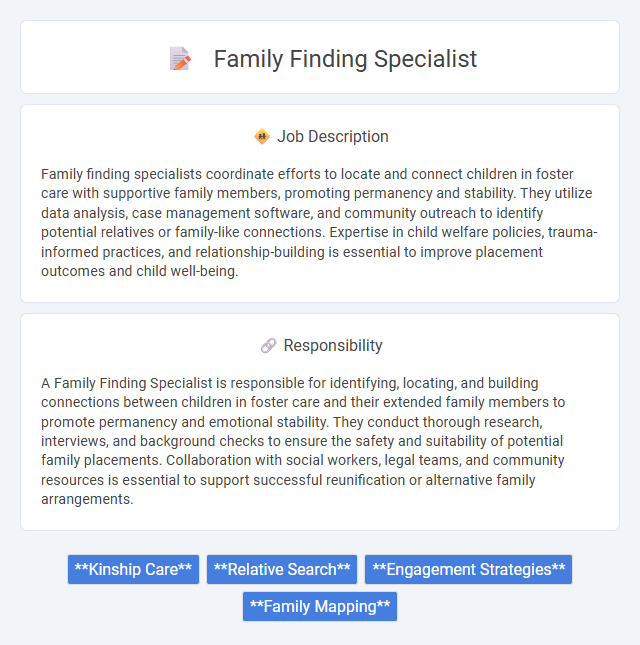
Family finding specialists coordinate efforts to locate and connect children in foster care with supportive family members, promoting permanency and stability. They utilize data analysis, case management software, and community outreach to identify potential relatives or family-like connections. Expertise in child welfare policies, trauma-informed practices, and relationship-building is essential to improve placement outcomes and child well-being.
Individuals with strong empathy, excellent communication skills, and a passion for supporting vulnerable populations are likely well-suited for a Family Finding Specialist role. Candidates who can navigate complex family dynamics and demonstrate patience and resilience will probably thrive in this position. Those struggling with high emotional stress or lacking interpersonal skills may find the demands of the job challenging.
Qualification
A Family Finding Specialist typically requires a bachelor's degree in social work, psychology, or a related human services field, with some positions preferring a master's degree. Strong knowledge of child welfare systems, trauma-informed care, and family dynamics is essential for effectively locating and engaging supportive family members. Certification or specialized training in family finding techniques and child advocacy can significantly enhance qualifications and job performance.
Responsibility
A Family Finding Specialist is responsible for identifying, locating, and building connections between children in foster care and their extended family members to promote permanency and emotional stability. They conduct thorough research, interviews, and background checks to ensure the safety and suitability of potential family placements. Collaboration with social workers, legal teams, and community resources is essential to support successful reunification or alternative family arrangements.
Benefit
A Family Finding Specialist likely improves child welfare outcomes by facilitating connections between children and supportive family members, enhancing emotional stability and permanence. Their role probably reduces the need for long-term foster care by identifying appropriate family placements quickly. This position tends to offer meaningful job satisfaction due to its impact on children's lives and supports professional growth in social work and family services.
Challenge
A Family Finding Specialist job probably involves the challenge of navigating complex family dynamics to locate and engage suitable relatives or support networks for children in foster care. It likely requires managing sensitive information and addressing emotional barriers that families may present. The role may also face constraints related to time and resources while ensuring the best interests of the child are prioritized.
Career Advancement
Family finding specialists enhance their career advancement by gaining expertise in child welfare systems, trauma-informed care, and advanced family engagement techniques. Pursuing certifications such as Licensed Clinical Social Worker (LCSW) or Certified Family Life Educator (CFLE) can lead to supervisory or management roles within social services agencies. Building a strong network with child protective services, foster care programs, and community organizations opens opportunities for specialized positions and leadership in family-centered advocacy.
Key Terms
Kinship Care
A Family Finding Specialist in Kinship Care expertly locates and connects children in foster care with suitable family members, promoting stability and permanent placements. This role requires in-depth knowledge of family dynamics, child welfare laws, and trauma-informed practices to support kinship caregivers effectively. Successful specialists enhance kinship networks, reducing the need for non-relative foster placements and improving outcomes for children.
Relative Search
A Family Finding Specialist specializing in Relative Search plays a crucial role in locating and engaging extended family members to support children in foster care or adoption processes. Utilizing database tools, social media, and public records, they identify biological relatives who can provide emotional and cultural connections, promoting child well-being and permanency. Expertise in legal and privacy regulations ensures sensitive handling of family information throughout the search and reunification stages.
Engagement Strategies
Family finding specialists implement targeted engagement strategies such as active listening and culturally sensitive communication to build trust with children and families. They utilize strengths-based approaches and community resources to foster positive relationships and encourage participation. Consistent follow-up and personalized support increase family involvement and long-term connection stability.
Family Mapping
A Family Finding Specialist uses Family Mapping to identify and connect children in foster care with their extended family members, promoting stable and supportive placements. This process involves detailed research of family networks, leveraging social work tools and databases to uncover potential caregivers. Effective Family Mapping improves child permanency outcomes by fostering connections that support emotional well-being and stability.
 kuljobs.com
kuljobs.com